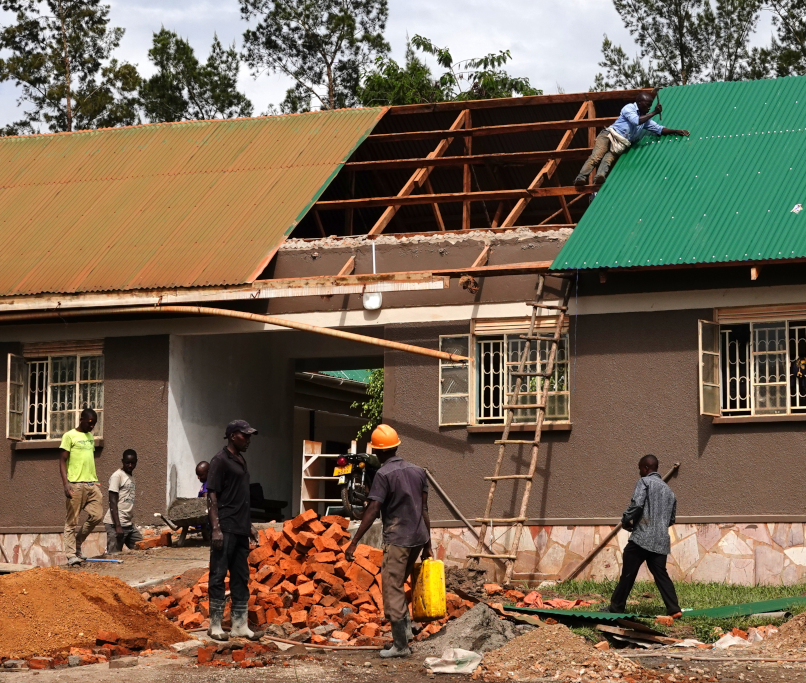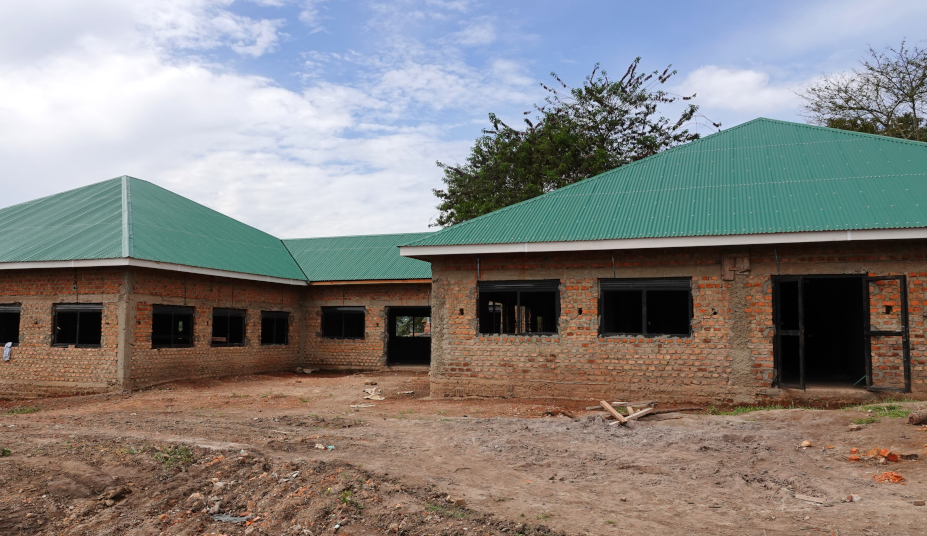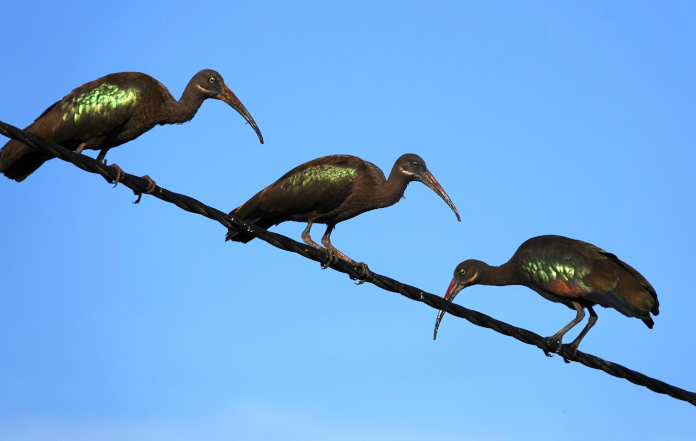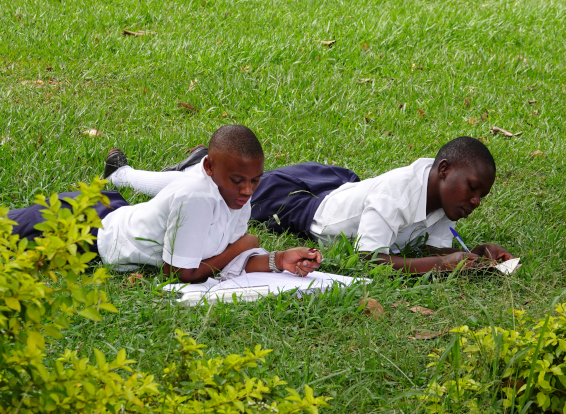November 2023
Helena visited Kibaale after Bram's passing to discuss the future of ICCF Holland with Kibaale Children's Centre and Kuwasha Canada. You can find her travel report here.
Corona Update
After I visited the project in March, the situation has become more
difficult. Fortunately, Uganda has very few cases of COVID-19. That is
because borders are closed for all but essential traffic. Tourists are
not allowed to enter. Schools are closed.
One of the side effects is that airmail has stopped working. Our staff
has attempted to post letters, but they were returned after a few
months. We are now scanning the letters, uploading them (when the
internet permits) and emailing them. I would rather send out physical
letters, but that is not feasible right now.
Our staff keeps working, the clinic is open. But many students are
lagging behind, since they can't attend class and online study is not
possible for all but a few students.
We hope and pray that the situation will improve soon.
March 2020
Bram Moolenaar, treasurer of ICCF Holland, visited the Kibaale Children's
Centre in March 2020. This is his report.
You can find more pictures on
Google Photos.
A dream come through
In 1994 on a quiet Sunday morning in Kibaale, the school nurse came to my door,
knocking politely. If I was busy? Not really. So, could I perhaps drive this
woman
to hospital? Oh, sure, what is the matter? Well, she is in labour, and has
been since yesterday afternoon, but now it's clear the baby is not coming and
she needs a doctor. I'm shocked: She has been in labour for almost a day?
Yes, and she is getting weak now. It becomes clear to me that this is an
emergency. There is no ambulance in town, and the only taxi is away. So we
quickly get ready, put a mattress in the back of my pickup truck, fetch the
lady and helpers from town and go towards Kalisizo hospital, about an hour drive
normally on this pothole littered dirt road. I ask the nurse: should I go
fast or drive carefully? She answers: "yes". So I go as fast as I can, while
avoiding the worst potholes. We reach the hospital, where she is taken over
by the staff. At this moment it looks like we did as well as we could, the
doctors are going to take care of her now. Unfortunately, two days later I
hear that a cesarean section was needed, but the woman was so weak she did not
make it. I felt terrible.
Ever since then I have been dreaming of a maternity ward in Kibaale. But
that is a huge project. Can we at least have a nurse station then? That
opened after a few years. Can we do more please? The nurse station became a
clinic, with laboratory and pharmacy. But no 24/7 service, and Kalisizo
hospital is still more than half an hour away, despite road improvements.
Women in labour are still in trouble when things don't go as expected.
Finally, it is happening! A fundraising event in Canada last year got us
enough money to build the ward, supporting buildings and buy the equipment
and furnishing. There will be three delivery rooms and several bedrooms.
Patients undergoing malaria treatment can also stay here.
A water system was made at the primary school, where we have a lot of roof to
collect water. From the huge lower tank water is pumped to the tanks at the
highest point of the school, from where a pipe brings the water to the clinic
by gravity. The roof and gutters of the primary school buildings were
renovated (which was long needed anyway) to avoid spilling water.
There is still quite a challenge in starting up the maternity clinic, hire
more staff and organise the work. And then we need to keep it up, pay the
salaries, stock the medical materials and maintain the equipment. We expect
the patients can only pay a fraction of the actual cost, we will rely on
donations to keep the clinic running.
|

The existing clinic is being extended and the old roof is replaced
|

One half of the new clinic wards
|

Ibises also appreciate the new power lines
|
|
|
Improvements
During my last trip the project was using a generator, the connection to
the electricity net was still to be made. That was done, now there is
electricity most of the day. There were only a few short blackouts while I
was there. It's great for several reasons, such as the office being able to
use a copying machine. And for me to keep sausages frozen on Sunday (see my
previous report). It's also much more environment friendly, most power in
Uganda is hydroelectric.
In the first years I was in Kibaale i had to climb a hill to use a mobile
phone. Over the years this got better, but using the internet was still
difficult, it either was very slow or didn't work at all. One telecom company
named Airtel has setup 4G antennas throughout the country, and finally there is
decent internet. Even the latency is low, using a remote shell to my home
machine worked quite well. Except late afternoon, for some reason it often
failed then.
|
Students
Even though I haven't mentioned it yet, the main purpose of the project is of
course to help children, provide primary and secondary education and support
them all the way through higher education. This works very well, the wall with
pictures of graduated students becomes fuller each year. I am proud of these
children that once were sleeping on a mud floor and have managed to become
trained professionals. A builder, tailor, teacher, nurse, doctor and now we
even have an MP. Boaz, a boy that lived at the project in 1994 and worked as a
lab technician in our clinic, is now the MP for Kooki county. You can find
info about him
here.
All this thanks to the support from our sponsors, these children would be
poor farmers otherwise.
|
|
|

Secondary school students studying in the grass
|

The facilities for visiting student groups have been improved
|
|
|
COVID-19
Fortunately the virus is not spreading in Uganda yet. They managed to isolate
Chinese workers coming back from holidays (many have have their own housing
near construction sites, which made this easier) and perform health checks at
the airport. I was lucky that my trip was just before flights were being
cancelled, a week later it would have been problematic. I really hope Uganda
manages to keep the virus out, if it would spread in Uganda the medical
facilities will be overrun very quickly.
While writing this report I got news that all schools in Uganda are now closed
in an attempt to lower the risk of spreading the virus.
Bram Moolenaar
You can find more pictures on
Google Photos.
|
top
|

